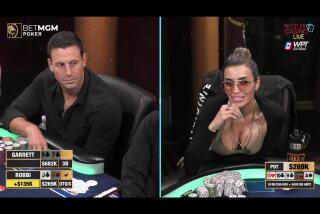By the Numbers : Solana Beach Tournament Winner Knows When to Hold ‘Em or Fold ‘Em
- Share via
John Cover plays poker by the book--and wins.
The Solana Beach man read his way to a poker tournament win, studying probability tables and statistical analyses in old books on poker strategy.
Cover, 42, has played poker since his college days, but it wasn’t until two years ago that he began to enter tournaments.
His first attempt ended in a less-than-spectacular 30th-place finish. But, just three tournaments later at the 7-Card Razz Tournament in the Amarillo Slim’s Super Bowl of Poker earlier this month, he outlasted the field--which included poker legend Johnny Moss--to claim the $41,600 top prize in Las Vegas.
Good poker players need more than luck and style, the general contractor said. The game requires concentration, strategy and a fair amount of arithmetic.
“The most important thing to me is to be conscious of what’s going on, exactly what the other people have done, what the cards are on the table, what your position is, who bet and how they bet,” Cover said.
The tournament itself was a 13-hour marathon that began shortly after noon on Feb. 5, with 104 players facing off on 15 tables. Every player bought in with $1,000 in chips and played until the last one was gone.
In 7-card Razz, the object is to get the lowest five-card hand out of seven cards, the lowest hand possible being an ace, two, three, four and five.
The key, he said, is to know when someone is bluffing and when to bluff.
“It’s a mixture of detective story, mathematics and luck,” said Cover, whose older brother is a mathematician at Stanford University and who got him started playing.
For example, Cover explained, the odds of starting a hand with three cards below seven are one in 10, so, if a player is betting hard more than 10% of the time, it is likely that the player is bluffing.
However, if a player bets hard only once in 10 hands, Cover said, the player is probably playing very conservatively except on good hands.
“Different people have different game (styles) that fit their personality, and they’re better at them,” Cover said.
Cover said his style of play keeps changing, which keeps opposing players guessing.
“One of the most important concepts in poker is changing gears, playing one way one time and another way another time,” he said. “It’s not like there’s a straight formula.”
Amarillo Slim, the sponsor of the 12-year-old tournament and several others worldwide, said Cover’s style at the tournament set him apart.
“It seemed to me that he played awful aggressive,” said Slim with a heavy Texas drawl. “And you have to be aggressive to get to that level.”
“You could tell he was from California and was comfortable with the Razz game. Most of these Texans and Southern boys don’t play Razz and aren’t used to it,” Slim said.
But Slim said the tournament Cover won was relatively small compared to the one that began Wednesday at Caesar’s Palace, which was worth $240,000 to the winner.
“He should be down here for this one. The winner gets paid more than the guys in the Super Bowl.”
At one point in the Razz tournament, Cover was down to a few hundred dollars, and on the brink of elimination.
“At that point, I didn’t feel scared, I felt wild.”
And playing wildly, he was able to recover.
“The key is not to get excited when you win or depressed when you lose. If you feel that your strategy is correct, it doesn’t matter if you win or lose, because you did what you could,” Cover said. “You need to play as well as you can with what you got and not have your emotions tied into that.
“Sometimes it’s easier to play a mediocre hand than a good hand,” Cover said. “If you have a terrible hand, you either throw it away or raise.”
It’s the second-best hands that hurt the most, he said, since they encourage the player to stay in the round, but lose just like the worst hand.
Cover said that, even though he overcame an outstanding field of players to win the tournament, he doesn’t feel that he has “beaten” them, particularly Johnny Moss.
“He is a legend, and I don’t think I (actually) beat him,” Cover said.
Cover began playing in tournaments two years ago when his business began to do particularly well and he could afford it.
“I don’t play poker for the money, I play for the competition,” he said, comparing the game to a chess match. “It’s a very mental game.”
He also applies some of his poker playing skills to business.
“Negotiating, for example, is kind of a poker game. It makes you evaluate things and act on them. It’s a little microcosm of the world. Intense, with defined rules.”
“And then you get up from it and go back into your bigger world.”
More to Read
Go beyond the scoreboard
Get the latest on L.A.'s teams in the daily Sports Report newsletter.
You may occasionally receive promotional content from the Los Angeles Times.










